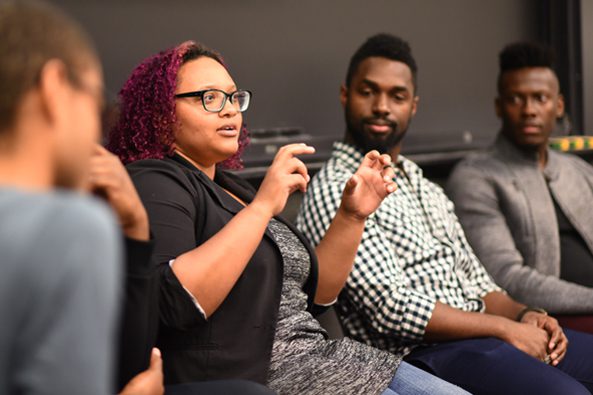Harvard Talks Analytics, MIT Explores Diversity in Tech, and More – Boston News

Let’s explore some of the most interesting stories that have emerged from Boston business schools this week.
Should an Algorithm Tell You Who to Promote? – Harvard Business Review
Professor of human resource management Jeffrey T. Polzar published a fictionalized case study that illuminates the influential role that “people analytics” algorithms play in steering hiring managers to which hot new talent. In a recent interview with Harvard Business Review, Polzar said:
“The day after Anne’s farewell party, Aliyah met with Christine and Brad Bibson, a data scientist on the people analytics team. ‘We’ve just started looking at networks,” Brad said, ‘and we think they can reveal some useful information. These are network analyses based on Molly’s and Ed’s e-mail and meeting history at BBI. With their permission and without looking at the content of their e-mails or calendars, we analyzed who they had been in contact with across the firm over the past six months.'”
Explore more of the fictionalized case study here.
Diversity in Tech a “People Problem” In Need of a Management Solution – MIT Sloan Newsroom
The MIT Sloan Coders Club recently hosted the Black in Tech and Entrepreneurship panel, in which a group of five entrepreneurs and engineers “shared experiences and offered suggestions on what tech companies can do to diversify their workforces and diminish bias.” Adam Taylor, founder of news app Black, explains:
“It is a people problem. When you think about the people that are on your teams professionally, how would you hire someone to work with you every day for however long they’re with your company? You tend to hire people you’re comfortable with.”

Students Roderic Morris of Drift, Amal Hussein, Nana Essilfie-Conduah, and Adam Taylor / Photo via Mimi Phan
Read more about this diverse take on tech’s diversity issue here.
AI Knows What Customers Want, Transforms Supply Chains – D’Amore-McKim Blog
D’Amore-McKim’s distinguished professor of supply chain management Nada Sanders uses Spanish “fast fashion” company Zara as the shining example of an optimized supply chain that uses artificial intelligence to drive customer satisfaction. In fact, many other businesses have begun to crib notes.
“Seven-Eleven Japan has taken lessons from Zara, using technology to microsegment demand and to understand what customers want. They will literally reshuffle and change what the merchandising looks like in the course of one day, in one location, for different segments of customers.”
Read more about professor Sanders’ research here.
Babson Reveals New Scholarships, Rankings, for Blended Learning MBA – MetroMBA
MetroMBA recently spoke with F.W. Olin Graduate School of Business faculty director Phillip Kim about the shape of the Babson Blended Learning hybrid online MBA program, shortly after the school earned some high praise from the likes of the Financial Times.
“Our program integrates the best of the ‘full-time’ graduate experience with a delivery format designed for working professionals, whose time is at a premium. Our students can complete their MBA in 21 months while working full-time. They learn from accomplished faculty, who are experts in their own disciplines and translate academic concepts into practical takeaways for our students. We are also the number one school for entrepreneurship education, and this ethos is infused throughout the program.”
Read more of our interview with Kim here.
How Natural Disasters Can Turn into Economics Disasters – Chicago News

Let’s explore some of the most interesting stories that have emerged from Chicago business schools this week.
Localized Natural Disasters Can Hurt an Entire Country’s Economy – Kellogg Insight
Northwestern Kellogg School of Management associate professor of managerial economics and decision sciences Alireza Tahbaz-Salehi set out to understand the large-scale economic implications of natural disasters.
Tahbaz-Salehi worked with Vasco Carvalho of the University of Cambridge, Makoto Nirei of the Ministry of Finance of Japan, and Yukiko Saito of the Research Institute of Economy, Trade and Industry in Japan. After the 2011 earthquake, “disaster-affected firms’ connections to companies outside the regions affected by the quake had a strong effect: these links accounted for a 1.2 percent decline in Japan’s gross economic output the year after the disaster.”

The aftermath of the 2011 earthquake in Japan hurt economic productivity for a lengthy period of time. Photo via Reuters
Tahbaz-Salehi says, “If these shocks start propagating from a firm to its customers, to its customers’ customers, and so on, they may also have an aggregate effect on the entire economy. But there have been almost no empirical studies to document whether these effects exist and how big they are.”
You can read more from Kellogg Insight here.
Hitting Rock Bottom After Job Loss Can Be Beneficial – Mendoza College of Business
To paraphrase Beckett, “Try, fail, try again, fail again, fail better.” Notre Dame Mendoza College of Business‘ Siegfried professor of entrepreneurship Dean Shepherd recently co-authored a study in Academy of Management Review with Indiana University’s Trenton Williams, which finds that on the road to success, failure is often the most revealing option.
“On the way down, we frantically do all sorts of things to try and repair the situation, and suffer as they fail. Bottoming out frees us from the misconception that the problems can be fixed, and in the process, frees us from other constraints and negative emotions and provides the conditions necessary to find a viable solution.”
He continues:
“‘A failed corporate executive might consider a variety of other potential roles,’ Shepherd says. ‘For example, sitting on the board of a nonprofit organization that is desperate for experienced managerial guidance, exploring government positions or running for office, working with startups, and so forth. Similarly, a failed entrepreneur might explore how skills learned in starting a business could be applied in a corporate setting, take standardized exams to be considered for law school or engage in other low risk exploration activities. In these cases, hitting rock bottom opens up myriad new opportunities.’”
Read more about the duo’s research here.
Would You Pay $20 a Day to Lease a Luxury Car? – Booth School of Business
University of Chicago Booth School of Business associate professor Daniel Bartels and the University of Rhode Island’s Stephen Atlas are scheduled to publish a new study in the Journal of Consumer Research entitled, “Periodic Pricing and Perceived Contract Benefits,” which finds that people “perceive more benefits from their purchases if they make payments on a periodic basis.”

Research from Booth shows that people feel their purchases are more valuable if its paid off in repeated cycles. Photo via NY Auto Show.
“Our framework and results suggest that periodic pricing can help people appreciate the benefits they accrue from a purchase. So, under the right conditions, marketers can encourage purchase with periodic pricing, even for significant sums of money.”
Read more about the duo’s research here.
Misty Johnson Named Business Dean – DePaul Driehaus College of Business and Kellstadt Graduate School of Business
As of March 1, the Driehaus College of Business and Kellstadt Graduate School of Business formally introduced its newest business college dean, Misty Johnson, Ph.D.
Johnson became the interim dean of the business college back in July, replacing former dean Ray Whittington. With her role now official, she has become the first-ever female dean of DePaul’s business school.
“Dr. Johanson has done a laudable job, and I’m pleased the college will continue to benefit from her leadership and expertise,” DePaul University Provost denBoer said in a press release.
“During her tenure this academic year, fall graduate business enrollment increased 16 percent; staff roles were reimagined to enhance the student experience; master’s program and center directors began collaborating more closely to support graduate program success, and the college forged stronger industry connections to support career opportunities. Johanson also launched a campaign with the Office of Advancement to raise $4 million for the college by the end of the academic year and exceeded the goal within the first six months.”
You can read more about the official appointment of Dr. Johnson here.
Verizon is on the Lookout for MBA Students and Grads

Telecom giant Verizon Communications provides wireless and wired telephone, internet and television service, in addition to cloud-based services to businesses. One of the largest wireless service providers in the United States, and among the largest communications technology companies in the world, Verizon employs nearly 200,000 employees—including a large number of MBAs.
Working at Verizon
Working at Verizon has its perks. In addition to competitive salaries and performance-based incentives, benefits include 401(k) savings with company match and discounts on Verizon products. Some Verizon offices also feature in-house gyms, or discounted gym memberships. The company is also committed to lifelong learning, providing training, development, and tuition assistance
Other worthy benefits Verizon employees can take advantage of include:
- Adoption expense assistance
- A matching gifts program
- Military discounts
- Employee Relief Fund for victims of natural disasters
- Best-in-class health and insurance benefits
- Healthy Pregnancy Program for expectant mothers
Verizon was also recently recognized as the top company for diversity leadership by Diversity MBA Magazine.
“Being good at diversity and inclusion is not an option at Verizon. With more than 180,000 employees serving customers in more than 2,700 cities spanning more than 150 countries, Verizon is privileged to serve a very vibrant and diverse marketplace,” said Magda Yrizarry, Verizon Chief Talent and Diversity Officer.
“Being successful with a customer base like this is not possible without a diversity of people, ideas, and experiences,” Yrizarry added.
According to Diversity MBA Magazine, Verizon recruiters maintain close relationships with organizations like the Society of Women Engineers, the National Society of Black Engineers, and Hispanic Business Students and Professionals. The company also has a fantastic track record of hiring women and minorities, with women and people of color making up about 60 percent of the company’s board of directors, while women specifically make up 37 percent of senior management.
Verizon was also one of the first major companies to offer benefits to same-sex couples in domestic partnerships and provide free preventative care services to women, such as on-site mammography screenings. The company is also well-known for its practice of recruiting veterans.
“Verizon is a diverse company in its people, ideas, services, and the communities it serves,” Yrizarry said. “Our workplace culture ensures that everyone, no matter their ethnicity or background, has opportunities to contribute to the solutions required to stay relevant and competitive in the marketplace, grow professionally and advance their career.”
Joining the Verizon Team
Verizon offers a number of internships and MBA Leadership Developmental Programs to graduate business students. According to MBA Exchange, these programs offer MBAs a first-hand rotational learning experience focused in different aspects of the company. With so many different paths and career opportunities at the company, these programs are an opportunity to build strong leadership skills in a particular division of Verizon.
MBA opportunities include:
- Marketing MBA Internship
- MBA Business Transformation Internship
- MBA Finance Leadership Developmental Program
- MBA Marketing Leadership Developmental Program
- MBA Product Management and Strategy Internship
- Supply Chain MBA Internship
What Are These Jobs Like?
Let’s take a look at some of these Leadership Developmental Programs. The Supply Chain MBA Leadership Development Program is a two-year rotational program designed to develop future Supply Chain leaders at Verizon. MBAs work on projects that develop skills in supply chain, operations, strategic planning, and sustainability. Students in the Supply Chain MBA Leadership Development Program may be assigned to any of the following focus areas:
- Supplier Management
- Strategic Supply Chain Planning
- Inventory Management and Logistics
Meanwhile, the Marketing MBA Leadership Development Program challenges business students with high-impact projects that develop their skills in branding, product management, and marketing strategy. The two year rotational program is designed to develop skills in:
- Business or consumer product management
- Marketing strategy
- Marketing operations
- Branding
- Promotions
Who is Verizon Looking For in New Hires?
Verizon specifically states the type of candidates they are looking for in various job descriptions on the web. These jobs call for “a motivated self-starter” who is “never satisfied with the status quo.” The telecom giant seeks candidates who are always trying to beat a personal best and thrive in fast-paced environments where new challenges come up every day. Prospective hires should be flexible, dependable, and work well in varying environments.
It’s also a plus if any MBA internship candidate has:
- Proven record of academic, professional and leadership achievement
- Excellent organizational, analytical and critical thinking skills
- Strong quantitative and technical skills
- Great verbal, written, communication and presentation skills
- Proficiency with Microsoft Office Suite
You can find more Verizon job opportunities here.
For a Career in Supply Chain Management, Head to Washington DC

Today’s boardroom is tomorrow’s chopping block. Business is a beast, no doubt, one whose needs grow increasingly demanding and complex along with those of we, the consumers, who drive it.
To navigate let alone thrive in this hectic environment requires unprecedented strategy, analysis, and execution. For many companies navigating the unruly seas, so to speak, the great white hope is an unsung hero of sorts: the supply chain manager.
Supply chain managers, or SCMS, have long been vital to the quality and productivity of projects. In short: SCMs oversee how all the constituent parts of their product—raw materials, information, and finance—move from supplier to manufacturer to wholesaler to retailer to consumer.
There are certainly lots of moving parts to this position—no pun intended—which makes sense why supply chain management has become such a popular concentration at business schools and an increasingly in-demand gig for graduates.
When it comes to ideal places to pursue an SCM degree, it doesn’t get any better than Washington DC, a cosmopolitan, cross-sectional hub for politics, business, and tech. In addition to its strategic mid-Atlantic location, sandwiched between the business centers of the lower Midwest, the upper Southeast, and the lower Northeast, the Chocolate City is home to a wide range of industry players, offering infinite access to whichever field you aspire to enter through an SCM degree. In addition to the warm, friendly folks like Lockheed Martin and Capital One that make their home in the Beltway, startups like HireKeep, NotionTheory, and Click2Mail do as well.
For you aspiring supply chain managers out there, we did the legwork for you and took a deeper dive into four DC metro degrees.
University of Maryland’s R.H. Smith School of Business
The UMD Smith MS in Supply Chain Management is consistently ranked as one of the most innovative in the region. Whether you’re looking to become a buyer, a logistics officer, freight specialist, or key account specialist, Smith will give you the “relevant, real-world experience” needed to “drive business growth, promote efficiency, sustain the planet,” and last but not least—impress recruiters. Smith’s deep ties to Wal-Mart, Bosch Rexroth, AstraZeneca, China Mobile Cooperation, and Unilever will surely benefit Smith MBAs. All graduates become Lean Six Sigma Yellow Belt™ (ICYB™) Certified by the International Association for Six Sigma Certification (IASCC).
Howard University School of Business
The Howard University School of Business‘ Supply Chain Management (SCM) concentration was designed specifically to prepare students for “leadership roles in global corporations and government entities.” Howard’s combination of faculty, curriculum, executive sponsorship, and real world experience means that graduates are well-equipped to meet the demands of an increasingly competitive job market.
CHECK THIS OUT: What Are The Differences Between The World’s Best Online MBA Programs?
Georgetown’s McDonough School of Business
Operations and Information Management (OPIM) concentration at Georgetown University’s McDonough School of Business is an interdisciplinary effort that combines Production and Operations Management, Operations Research/Management Science, Statistics/Decision Analysis, and IT/Systems Management. OPIM was designed to create opportunities for research and employment within information systems that support decision processes, risk management, business analytics, and global operations.
George Mason University School of Business
The George Mason University School of Business offers a Project Management concentration that might appeal to MBA candidates with an interest in supply chain. The Project Management concentration—available both online and on-campus—was designed to give MBA candidates the “knowledge and skills needed to manage major projects from conception to implementation.”
Scheller College Professor Beril Toktay Honored for Work in Operations Management

L. Beril Toktay, a professor at the Georgia Institute of Technology – Scheller College of Business, was recently named as a Distinguished Fellow of the Manufacturing and Service Operations Management Society (MSOM).
Former Neeley Faculty Awarded for Supply Chain Success

Nancy Nix, the former Executive Director of the Executive MBA program at the Texas Christian University – Neeley School of Business, was recently awarded with the Distinguished Service Award from the Council of Supply Chain Management Professionals.
